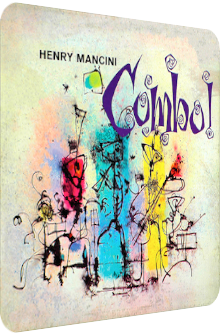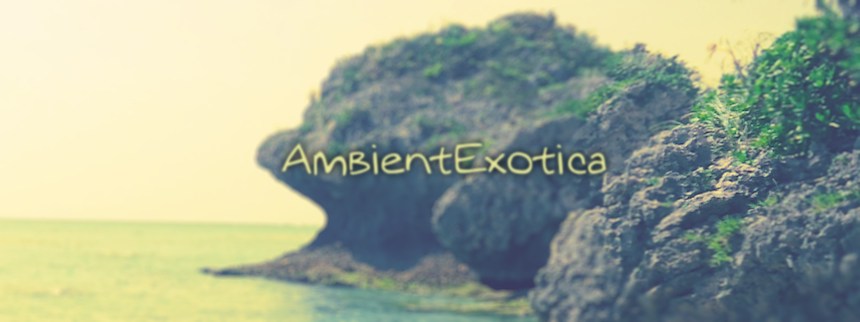
Henry Mancini
Combo!
1960
Combo! by Henry Mancini (1924–1994) is a harpsichord-fueled brass-laden Space-Age artifact with Exotica particles. Released in 1960 on RCA Victor, a specialized label in these fields at the time, it features the unsurprising amount of 12 tracks, four of them unique tunes written by Mancini himself, with another eight renditions of worldwide hits and lesser known material distributed all over the album, ranging from Cuba over Scandinavia to the Mexican border. In addition, Mancini even visits different eras of yore and comes up with gleeful Gothic smashers and burlesque Baroque blunder, and these are but two instances of the things to come.
Although it is not expressed in the liner notes, Combo! is all about the Space-Age ambiance and its flamboyant cocktail culture rather than truthful Latin cuts or faux-Polynesian paradises. Fans of Henry Mancini sense where I am heading over the course of this review: he dares to forcefully integrate a harpsichord in the vast majority of his arrangements, whether it fits the mood, serves a certain purpose or is completely de trop. The harpsichord is an – or rather the – instrument that curiously enough turns up on many of Mancini's records where it is known and feared for constantly destroying the formerly well-balanced aura. However, it sort of works on Combo! if the listener is willed to accept or actually embrace its melodramatic or grandiloquent physiognomy. The album features the talents of a so-called undectet, an ensemble of eleven musicians, among them brass players Dick and Ted Nash, pianist and harpsichord player Johnny Williams (yes, the hyper-famous composer John Williams), guitarist Bob Bain, bassist Rolly Bundock, drummer Shelly Manne, conga player Ramon Rivera and vibraphonist Larry Bunker, among others. Combo! is no dedicated Exotica record. However, all is not lost: its colorful track titles, the fleeting visits to foreign countries plus the all around bubbling quirkiness make it an interesting artifact for fans of that genre, a record which is further dissected below.
Bobby Timmons' Moanin' kicks off the combolicious artifact with those typically jazzy hi-hats before a colorful take on that sleazy spy movie atmosphere is presented in the shapes of polyphonous brass accompaniments, Larry Bunker's vibraphone droplets and bursts of horns. The ultimately bewildering inclusion is, of course, the harpsichord, a device that is all the more dazzling on the stereo version of the record where it is placed far on the right. Add Shelly Manne's electrifying drums to the arrangement and you get a… hmm… I'm not so sure what you get, for Johnny Williams' harpsichord is far out of place on this one, yet a constituting factor of the Space-Age aura.
Irving Mills', Ben Oakland's and Mitchell Parish's Sidewalks Of Cuba follows, and since it gets almost rid of the harpsichord and unleashes gorgeously sun-dried marimba-piano tone sequences that remind of jolly Samba rhythms, it oscillates towards tropical locations. These harmonies are chock-full of thermal heat, gleam in yellow timbres and are delicately exotic. The horns add a more conventional big band theme to the tune, especially that jazzy segue in the middle brings the listener back to a concrete jungle of his or her choice and ennobles it with fleeting harpsichord splinters. Sidewalks Of Cuba is anything particularly mind-blowing; notwithstanding this assertion, it is a well-crafted carefree rendition.
The following Dream Of You by Jimmie Lunceford and Michael Morales is a downbeat emerald whose punchy bassline by Rolly Bundock works marvelously well with the dreamy vibraphone globs, the alto saxophone melodies by Ted Nash as well as John William's plinking piano. The interplay is really great on this one, no instrument is played over the top, everything is perfectly balanced, making Dream Of You a song that is as moony as it is nocturnal, and yes, there is a stark difference between these two. While Henry Mancini's great composition Swing Lightly unchains the harpsichord right from the get-go and lets its creepy-jocular dichotomy coalesce with wave-like basslines, fiery brass layers and Bob Bain's superb – and all too rarely used – guitar chords, Ervin Drake's, Al Sears' and Jimmy Shirl's Saturday night anthem Castle Rock takes place in Otranto, at least on this album, for the Gothic-grotesque harpsichord stabs are prominently featured in tandem with warmhearted and uplifting brass layers and soothing vibraphone accents. The tempo in the upper regions as well as Ramon Rivera's sudden conga flecks make this a pure joyride, partially exotic, but all the more draped in a Space-Age atmosphere.
The final piece of side A goes from Gothic climes to Baroque times: Henry Mancini's A Powdered Wig is a chintzy-saccharine harpsichord hyperbole akin to Enoch Light's later Space-Age escapades in Spaced Out (1969). Add Ted Nash's performance on the Pagan alto flute to the setting, top it off with big band brass blebs, and the result is: delightfully disturbing. This track is memorable, but for no good reasons.
Side B starts with Cy Coleman's Playboy Theme. Of cooourse, the harpsichord has to be on board, thus destroying the otherwise nightly atmosphere of dreaminess, lewd hopes and coolness. The marimba spirals are shining though. I like both Nelson Riddle's interpretation included in Witchcraft! (1958) and Dick Schory's take on his album Politely Percussive (1963) better. Next is the magnificent Tequila by Chuck Rio, the ultra-famous ode to booze-fueled parties with a strong Exotica flavor due to the great conga and cowbell infusions, marimba rivers in fluxion, multitudinous paradisiac flutes, and heck, even the harpsichord does not diminish this jungular atmosphere. The brass players play deliberately over the top, drunken hiccups-interspersed Jajaja chants are stereotypical at best and racist at worst, but deemed vivacious at the time. All in all, Tequila is well-arranged. And so is Mancini's own Far East Blues, a glockenspiel-underlined, marimba-kindled harpsichord blues with a wonderfully dense atmosphere thanks to the reeds and flutes. And yes, even the harpsichord cannot degrade the soothing and distant traces of the Far Eastern melodies. This one is a great piece, mystical, moonlit and mellow. And it ends with a Chinese gong, well done!
Whereas Robert Bruce's, Horace Henderson's and Leroy Kirkland's Charleston Alley is changed into a perverse harpsichord hydra with the application of a superb makeup in the form of Bob Bain's guitar riffs as well as muffled marimba molecules and many horn eruptions coded into its genetic material, Svend Asmussen's Scandinavian Shuffle is a James Last-like piece of ephemeral jumpiness with one too many horns and that sweeping shuffle sound that is hinted at in the title already. The finale is Everybody Blow!, another composition from Mancini's feather. The ebbing and flowing double bass wave meanders throughout the piece, with reverberated aqueous marimba tittles, carved out guitar lines, harpsichord dots and brass structures being presented one after another, showcasing the talents of each band member. It is a non-essential, rather weak endpoint to a wishy-washy Space-Age LP.
Without lamenting ad infinitum or putting all too much blame on John Williams and his beloved harpsichord, it is this very instrument that is both a distinct marker of Henry Mancini's career in general and Combo! in particular. Whenever it appears, its texture-related quality and glowing timbre is seemingly out of place at worst or towering above even the blasting brass strata in its best moments. It is as if Henry Mancini implies "you better like the spacey-retrogressive duality of this instrument, or else," and so it happens that it reigns in otherwise perfectly common big band concoctions, in tropical marimba mountains and blissful beaches. In contrast to Music Of Hawaii whose late existence in 1966 is initially caused by the Hollywood epic of the same year, the harpsichord works better in such cocktail-suggesting environments of the modern era than in tandem with the return-to-paradise faux-Polynesian escapism. Heck, even the wonky audacity named A Powdered Wig is so far off (or out) that it is perfectly suitable for shocking a few innocent bystanders or guests at your party.
The sound quality is top-notch, the stereo effect offers a great plasticity, the manifold instruments and the prominent use of the marimba induce a certain Exotica feeling, but make no mistake, Combo! is much more Latin than Polynesian. Favorites include the interpretations of Tequila and Sidewalks Of Cuba. Combo! is, at the end of the day, a brass-focused travelog à la Bert Kaempfert's The Magic Music Of Far Away Places (1964), albeit much spacier, and a harpsichord heaven akin to Mike Simpson's Jungle Odyssey (1966), but without field recordings. It is one of Mancini's better harpsichord albums, regularly reissued and available on LP, CD and as a download version.
Exotica Review 230: Henry Mancini – Combo! (1960). Originally published on Jun. 22, 2013 at AmbientExotica.com.
